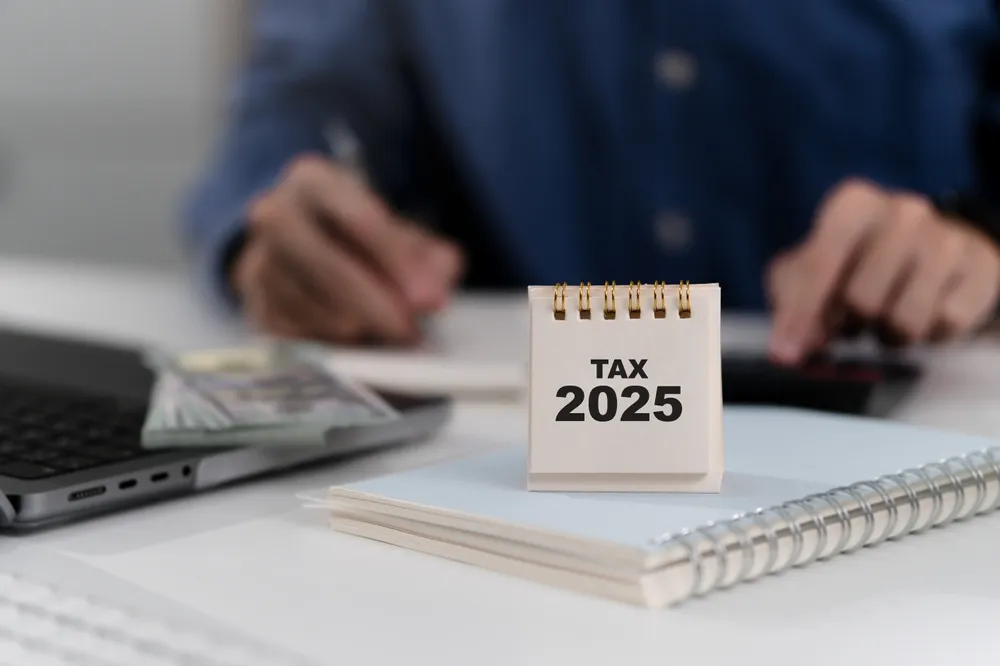Business News
Union Budget 2025 Highlights: No tax on up to ₹12 lakh income, healthcare for gig workers and more

8 min read | Updated on February 01, 2025, 18:03 IST
SUMMARY
Union Budget 2025 highlights: Finance Minister Nirmala Sitharaman presented the Union Budget 2025 in the Parliament on February 1, offering much-needed relief to taxpayers. Check all key highlights of the budget, along with tax-related updates.

Union Budget aims to empower India's rising middle class, said FM Sitharaman
Finance Minister Nirmala Sitharaman presented the Union Budget 2025 in Parliament today, with many important announcements making waves across various sectors. Check all the Union Budget 2025 highlights here.
Budget 2025: Key Annoucements
-
Tax relief: No income tax for up to ₹12 lakh. Other than special rate income like capital gains, there will be no tax payable for taxpayers earning up to ₹12 lakh per annum under the new tax regime. Consumption boost on cards with lower tax for middle class.
-
New tax slabs:
| Income Range (in ₹) | Tax Rate |
|---|---|
| 0 - 4 lakh | Nil |
| 4 - 8 lakh | 5% |
| 8 - 12 lakh | 10% |
| 12 - 16 lakh | 15% |
| 16 - 20 lakh | 20% |
| 20 - 24 lakh | 25% |
| Above 24 lakh | 30% |
- Income tax exemption limits over the years
| Year | Income (in ₹) |
|---|---|
| 2005 | 1 lakh |
| 2012 | 2 lakh |
| 2014 | 2.5 lakh |
| 2019 | 5 lakh |
| 2023 | 7 lakh |
| 2025 | 12 lakh |
-
The government has allowed taxpayers to claim the annual value of two self-occupied properties as Nil.
-
Individuals with an annual income of ₹18 lakh will get the benefit of ₹70,000 in tax, FM announced. Tax relief as per budget announcements:
| Income (in ₹) | Tax Benefit (in ₹) | Effective Tax Rate |
|---|---|---|
| 12 lakh | 80,000 | 0% |
| 16 lakh | 50,000 | 7.5% |
| 18 lakh | 70,000 | 8.8% |
| 20 lakh | 90,000 | 10% |
| 25 lakh | 1,10,000 | 13.2% |
| 50 lakh | 1,10,000 | 21.6% |
-
A new income tax bill will be introduced next week. The new Income Tax bill will be simpler to understand and will reduce litigation, FM said.
-
The FM announced plans to increase the annual threshold for deduction of tax at source (TDS) on rent to ₹6 lakh from the existing limit of ₹2.4 lakh.
Some major announcements by FM Sitharaman
-
Union Budget aims to empower India's rising middle class, said FM Sitharaman. The budget is aimed at enhancing the spending power of the middle class.
-
Budget 2025 focuses on 10 broad areas covering Garib (poor), Youth, Annadata (farmers) and women (GYAN).
-
The budget aims to put forward 'transformative' reforms in 6 areas including taxation, financial sector, power sector, urban development, mining and regulatory framework.
-
India's development in the past 10 years and structural reforms have drawn global attention, said Sitharaman.
-
The government is focused on ensuring that the central government’s debt is reduced every year, FM said. The revised fiscal deficit estimate is 4.8%.
-
Tax relief: The tax deduction limit for senior citizens will be doubled to ₹1 lakh from the existing ₹50,000.
-
A committee to review and recommend new reforms aimed at enhancing the ease of doing business will be formed.
-
The government's gross and net borrowing for FY26 (2025-26) is expected to be at ₹14.82 lakh crore and ₹11.54 lakh crore, respectively. This is similar to FY25, in which the gross and net borrowing stood at ₹14.13 lakh crore and ₹11.75 lakh crore, respectively, Moneycontrol noted.
-
The goal of 'Viksit Bharat' includes achieving zero poverty, quality education and high-quality, affordable and comprehensive healthcare, said FM.
Agriculture sector announcements
-
The government plans to launch a 6-year program for Atamnirbharta in pulses with a special focus on tur, urad and masoor.
-
The central government will enhance the limit for the interest subvention scheme for Kisan Credit Card from ₹3 lakh to ₹5 lakh.
-
FM announces Mission for Cotton Productivity for five years to help Extra Long Staple Cotton varieties for quality cotton aimed at reviving India's textile sector.
-
PM Dhan Dhanya Krishi Yojana in partnership with states is planned by the centre to cover 100 districts with low productivity, moderate crop intensity and below-average credit parameters. The scheme is expected to help 1.7 crore farmers.
-
In partnership with states, a multi-sectoral ‘Rural Prosperity and Resilience’ program will be launched to address under-employment in agriculture through skilling, investment and technology, aimed at boosting the rural economy. This initiative's goal is to generate increased opportunities in rural areas. In its first phase, 100 developing districts will be covered.
-
A Makhana board will be established in Bihar to improve the production of Makhana and support Makhana farmers.
MSMEs and other employment-related announcements
- Credit Guarantee Cover announced:
-
For Micro and Small Enterprises: From ₹5 crore to ₹10 crore. This will lead to additional credit of ₹1.5 lakh crore in the next 5 years.
-
For startups: From ₹10 crore to 20 crore with a moderated guarantee fee of 1% for loans in 27 focus sectors.
-
For well-run exporter MSMEs: For term loans of up to ₹20 crore.
-
MSMEs are the 2nd engine of growth, being responsible for 45% of the country's total exports, said FM.
-
FM Sitharaman announced revised investment and turnover limits for the classification of all MSMEs, enhancing to 2.5 and 2 times respectively.
| Category | Investment (Current) | Investment (Revised) | Turnover (Current) | Turnover (Revised) |
|---|---|---|---|---|
| Micro Enterprises | 1 | 2.5 | 5 | 10 |
| Small Enterprises | 10 | 25 | 50 | 100 |
| Medium Enterprises | 50 | 125 | 250 | 500 |
Other key announcements
-
Street vendors to get UPI-linked cards with a limit of ₹20,000, announced Sitharaman.
-
Gig workers will be provided healthcare under PM Jan Arogya Yojana. This initiative will help nearly 1 crore workers. Furthermore, the centre will provide Gig Workers with identity cards and registration on the e-Shram portal.
-
FM Sitharaman announced the establishment of 3 centres of excellence for artificial intelligence with a planned outlay of ₹500 crore.
-
A total of 5 national centres of excellence for skilling will be set up and additional educational infrastructure will be created in 5 IITs that were established after 2014. National Manufacturing Mission to support clean tech manufacturing is also announced. This will support the domestic production of EV batteries and solar panels.
-
The government will develop top 50 tourist sites across the country in partnership with states, says FM Sitharaman.
-
Focus on Bihar: IIT Patna and the Patna airport to be expanded, and Greenfield airports to be set up in the state.
-
50,000 Atal Tinkering Labs will be set up in government schools in the next five years, said FM.
-
Medical tourism will be promoted in the country, along with easier visa norms.
-
Broadband connectivity will be provided to all government secondary schools and primary healthcare centres, said FM Sitharaman.
-
A revised central KYC registry will be rolled out this year to simplify the KYC process.
-
The centre plans to introduce the Jan Vishwas Bill 2.0 to decriminalise over 100 provisions. Additionally, an investment-friendly index of states will be launched in 2025, FM said.
-
FDI limit in the insurance sector raised to 100% from 74%, FM announced, adding that a forum for regulatory coordination and development of pension products will be set up.
-
FM announced plans to launch a new policy for leather and other footwear sectors.
-
36 new lifesaving drugs and medicines will now be fully exempted from Basic Customs Duty. Moreover, 37 more medicines and 13 new patient assistance programs to be exempted from Basic Customs Duty (where they are supplied free of cost to patients).
-
EV battery manufacturing: The cobalt powder and waste, lead, zinc, scrap of lithium-ion battery, and 12 more critical minerals will also be exempted from Basic Customs Duty (BCD), FM announced. Moreover, 35 additional goods for EV battery manufacturing, and 28 additional goods for mobile phone battery manufacturing will be added to the list of exempted items.
-
The FM also announced a framework to support the aquaculture sector in India.
-
The centre has allocated ₹20,000 crore to implement Research, Development and Innovation driven by the private sector under the initiative announced in the July Budget last year. It is also exploring a Deep Tech Fund of Funds to promote deep tech innovation in the country.
By signing up you agree to Upstox’s Terms & Conditions
About The Author
Next Story

